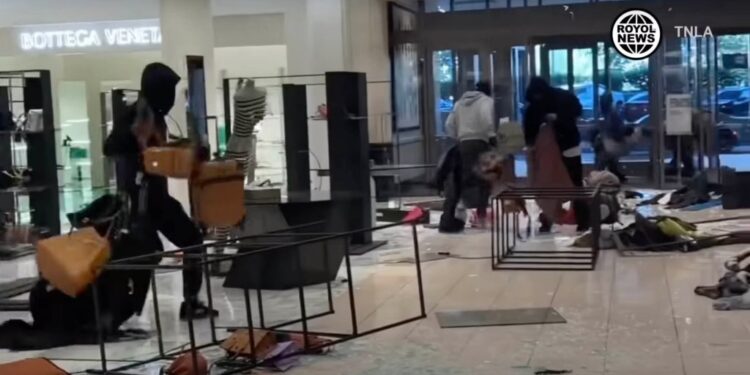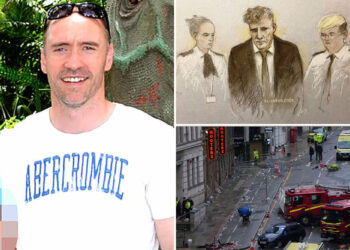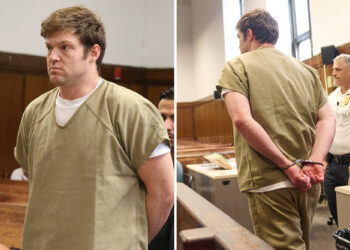Smash-and-grab robberies are happening in broad daylight at stores throughout California and no one seems to be doing anything to stop them.
Two weeks back, a Nordstrom store in the west San Fernando Valley area of Los Angeles was attacked by a flash mob of 30 to 50 masked thieves.
They made off with armloads of designer merchandise valued at an estimated $60,000 to $100,000.
Online video of the robbery showed metal-and-glass display shelves sliding along the floor as the thieves dragged expensive handbags, still attached to anti-theft cables, toward the exits.
The previous week, a gang of thieves helped themselves to about $300,000 worth of goods from a Yves Saint Laurent store in a shopping mall owned by the recent candidate for LA Mayor, Rick Caruso.
And last Sunday, two robbers carrying trash bags ran into a Nike store in East LA and strolled out with shoes and other merchandise.
From store employees to police to prosecutors, the response to these smash-and-grabs seems to be, “Not much I can do about it.”


California’s criminal-justice system is broken and state voters helped to break it.
But voters had help from deceitful activists and politicians who tricked them into thinking they were voting for greater public safety.
One of those deceivers is George Gascón, now district attorney of Los Angeles County, where nearly 10 million residents in 88 cities are living with the full consequences of the 2014 initiative Gascón co-authored, Proposition 47.
The authors named the proposed law The Safe Neighborhoods and Schools Act.

It promised to save money on costly incarceration and spend the savings on mental health and education programs.
With a favorable ballot description written by then-Attorney General Kamala Harris, it passed 60% to 40%.
Under Proposition 47, property thefts valued at less than $950 became an automatic misdemeanor, even if the stolen item was a handgun.
The measure also made incarcerated felons eligible for resentencing and release if their past crimes retroactively qualified as misdemeanors.
Californians quickly discovered that the promised “Safe Neighborhoods” had a lot of car break-ins.
Two years after Prop. 47 passed, then-Governor Jerry Brown decided to promote his own criminal justice reform initiative.
Proposition 57 increased parole and “good behavior” opportunities for felons convicted of a “nonviolent felony offense,” a term that conveniently was left undefined.
Supporters named the measure “The Public Safety and Rehabilitation Act of 2016.”
Harris wrote another favorable ballot description and Brown led a campaign that outspent opponents by roughly 15 to 1.
It turned out that the list of crimes considered “nonviolent felony offenses” includes rape of an unconscious person, supplying a firearm to a gang member, hostage-taking, human trafficking, domestic violence with trauma, and attempting to explode a bomb at a hospital or school.

Voters had an opportunity in November 2020 to approve an initiative that would have reformed Propositions 47 and 57 by reclassifying specific crimes to allow tougher penalties.
This was Proposition 20.
The initiative would have helped undo so much of its predecessors’ damage, but it went down in defeat, 62% to 38%.
In California, it’s a lot easier to vote than to know what you’re voting for.
Gascón was elected district attorney in November 2020 after promising voters he would reduce both crime and costs to taxpayers.

He hasn’t delivered.
On his first day in office, Gascón announced “directives” to end cash bail, ban prosecutors from seeking enhanced sentences, and stop prosecuting first-time offenders for various “nonviolent” crimes.
He ordered a review of past convictions to see if resentencing or release would be warranted.
He ended the practice of trying some juveniles as adults.
“I ask you to join me on this journey,” he said.

Almost three years later, it’s looking like the end of the road for Gascón, who narrowly escaped a recall effort last year.
LAPD Chief Michel Moore said he blames the DA’s policies for “weakening the consequences under the law for many repeat offenders.”
At a news conference last week, reporters pummeled Gascón with questions about whether his policies were contributing to the wave of smash-and-grab robberies.
He glared at them and snapped that they didn’t have the facts.
Still, the facts are on the ground. “We feel like we can’t walk in our own neighborhoods anymore,” one former supporter of Gascón told The Post, “These criminals are not getting prosecuted — and they know it.”
Susan Shelley is a columnist and editorial writer for the Southern California News Group. On Twitter @Susan_Shelley.



























